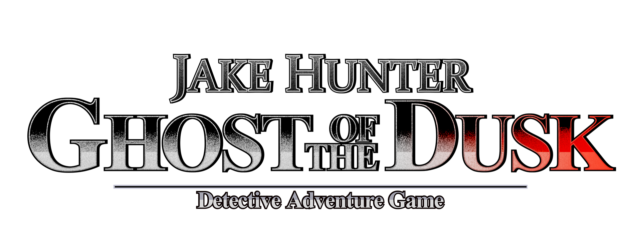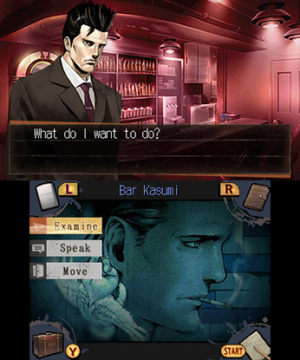Intricate, hand drawn visuals; engaging storyline; investigation segments are entertaining
The challenge is too light; no indication when segments of conversation have been completed
One of the great things that carried over from Nintendo DS to 3DS was the advent of the visual novel in portable form here in the west. Visual novels are a fascinating genre within video games, as the brunt of the “gameplay” in these titles revolves around reading. Of course, reading isn’t unusual in gaming— ask anyone who’s played through an RPG or JRPG and they’ll quickly attest to the voluminous amounts of text that those types of games regularly require players to read through. The difference is that in J/RPGs, the reading is accompanied by a lot of different gameplay mechanics, like battling, a leveling system, character customization, jobs, an overworld to explore, etc. Visual novels put the reading at the forefront of the gameplay and then compliment it with light exploration, puzzle solving, and (in the better titles) some killer graphics/artwork.
3DS has had more than a few visual novels since its launch back in 2011, including multiple entries in the Phoenix Wright and Zero Escape franchises. Now joining their ranks is Aksys Games’ Jake Hunter Detective Story: Ghost of the Dusk. Although Jake Hunter will likely be most recognizable to western players for his two Nintendo DS games (Jake Hunter: Detective Chronicles and Jake Hunter Detective Story: Memories of the Past), the series is actually over 20 years old. Starting out on the Famicom Disk System in Japan in 1987, Jake Hunter has had a lengthy string of titles across multiple platforms for a very long time now. With Ghost of the Dusk, the series has made a marked improvement compared to the two installments on DS, making it a game that’s definitely worthy of a play by 3DS owners.
It’s fitting that Jake Hunter is a product of the ’80s, as Ghost of the Dusk has some of the requisite cheesiness of a police procedural television show from that era. Jake’s a private investigator who tackles a wide variety of cases. As Ghost of the Dusk begins, he’s just finished sleuthing out the location of a missing pet and is looking to celebrate by polishing off some liquor with his friends at a local bar. As the festivities are about to begin, they’re interrupted by word of a body that has been found at a local derelict mansion. The person who discovered the fresh cadaver comes into the bar in a panic, setting the events of the first case into motion. There’s a supernatural angle that’s introduced initially but quickly is shunted and gives way to a much more grounded storyline. I ultimately wasn’t bothered by the switch, as Jake’s meant to be a hardboiled, noir-esque detective. So many video games are fantasy-based, and the ones that aren’t tend to skew towards war or action movie “realism.” This is so often the case that the more mundane trappings of a detective tracking down leads gives Ghost of the Dusk a vibe that I wish there was more of in the industry.
Yet, as I noted above, Ghost of the Dusk isn’t exactly shooting for highbrow storytelling. Jake Hunter certainly isn’t as goofy as Phoenix Wright and the over-the-top trials that the beloved lawyer is known for, but it’s also not on the level of watching a gritty crime thriller like L.A. Confidential or Memento. Basically, the writing here is similar to something in a TV cop show like Blue Bloods or Law & Order. It’s an entertaining narrative, just a tad bit formulaic and predictable. The localization work is solid, though, and greatly contributes to the experience. Some of the dialogue does suffer from odd word choices and being somewhat verbose, but overall I enjoyed reading everything Jake and all the different members of the cast had to say.

Graphically, I really liked what developer Arc Systems Works did with the visual design. Although it doesn’t get quite as adventurous as, say, Hotel Dusk, which utilized a delightful sketch-like quality throughout the game, Ghost of the Dusk has some excellent manga/anime-style art on every screen. It’s a wonderful art style that really suits the moody, brooding vibe of Ghost of the Dusk. A visual novel like this lives and dies by its writing, of course, but the visuals also have to help compel the player to stick around—after all, this isn’t a true book. A visual novel is still at its core an interactive experience, but with the gameplay depending largely on static imagery, those images in turn need to have some punch or swagger to them. On that front, Ghost of the Dusk has done a great job from an aesthetic standpoint.
In terms of functionality, the visuals also work in solid tandem with the gameplay itself. Other than reading, the bulk of the player’s time is spent investigating. This boils down to talking with other characters to perform Talk Profiles and combing crime scenes for clues. Thankfully, the clear, detailed imagery makes it a breeze to probe environments and determine which pieces of a given scene require a closer look. There are two ways to interact with environments: one is via the touch screen and taps of the stylus, the other is by using the Circle Pad and the face buttons. I actually found the more traditional stick and buttons combo to be the best control option, as the on-screen cursor that pops up when playing this way provides a color indicator to signal points of interest that need investigating. It was rare that I wouldn’t know which part of the environment needed to be looked at, but it did help the few times I found myself stuck.

Talk Profiles, meanwhile, are where Jake goes to work using logic to piece together the truth as he talks with witnesses and people of interest. When players enter a given room or location, Jake can scan his surroundings and provide a quick overview of what he sees, including the people in it. Jake can also speak with those who are present, as well (although I would’ve liked to see some indicator appear next to completed branches of conversation). During a Talk Profile, Jake’s detective skills come to bear, as he uses deductive reasoning to figure out if someone is lying to him, or if they need some help remembering certain events, etc. The Talk Profiles certainly offer some entertaining back-and-forths, but they suffer the same problem that the entirety of Ghost of the Dusk has— it’s all a little too easy.
There’s no penalty for making the wrong deductions. Scanning crime scenes is rarely taxing. Overall, Ghost of the Dusk is more concerned with progressing its narrative than challenging players. In a video game, that’s not always a sin, but in a visual novel like Ghost of the Dusk, where its storyline is entertaining but not spectacular, the gameplay should serve to balance out any of the narrative’s deficiencies. Sadly, that’s not the case here. Ultimately, I found “solving” Ghost of the Dusk’s mysteries to be a tad rote by the end. Still, despite some slight repetition, the mechanics here are soundly implemented and I rather liked my time in Jake Hunter’s world. There are multiple extra cases (which were formerly mobile releases in Japan) available to play, including a hilarious bonus that depicts Jake in a chibi form, which should keep players busy for a good, long time. Don’t sleep on Ghost in the Dusk; it’s a pleasant addition to the 3DS library of games.
Nintendojo was provided a copy of this game for review by a third party, though that does not affect our recommendation. For every review, Nintendojo uses a standard criteria.




 ShareThis
ShareThis





